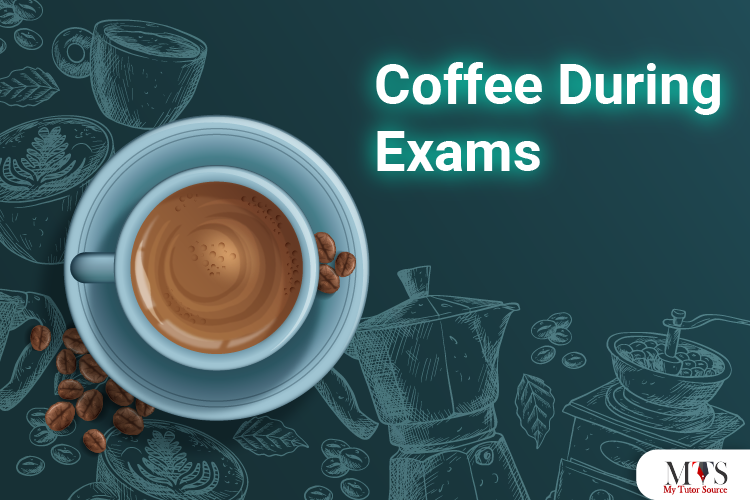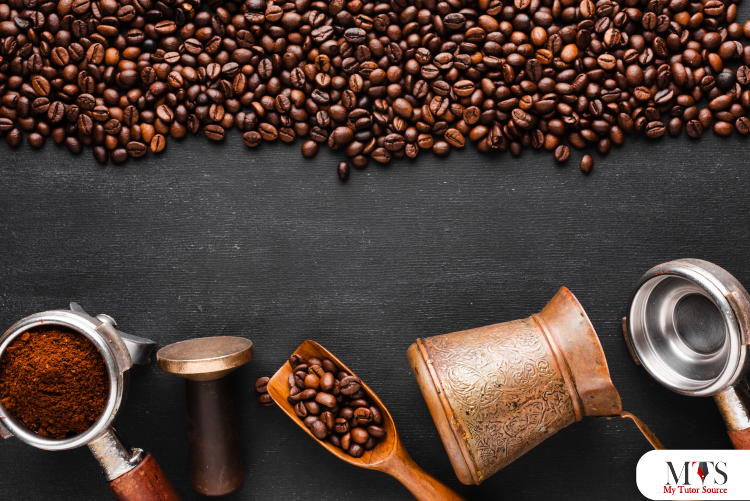

Coffee and its effect while studying have always been a subject of debate as to how much caffeine should be consumed for it to have a positive effect on the mind and when it should be consumed. If you are a student, teacher, or private tutor, here you can read about the details related to caffeine’s effect on the brain when consumed through coffee or tea.
Many people have different views on whether or not coffee should be consumed before an exam. Exams time is often perceived to be as a stressful time for students. In order to study all night long and to learn more than usual, the mind needs to be fresh so that they won’t have to face sluggishness. If they are being lazy while studying for their exam, they will waste the important time they could’ve utilized in studying and learning the important stuff. Laziness also leads them to forget about what they studied when they are right in the middle of attempting their exam because they did not study it with proper attention.
This needs a solution, and students tend to incline towards coffee or tea as a solution to help them be active and prepare for the exam correctly, but the question arises if it is really as effective as it is assumed or is it an overrated concept.

There are several ways that are associated with coffee impacts students while studying. Here are some of them that are seen to have been impacted by the consumption of coffee before a study session.

Coffee has a notable effect on your sleeping pattern. It has been noted that caffeine helps you to stay up if you are feeling drowsy. For this reason, many students choose to drink tea or coffee in order to ward off drowsiness, especially at night when they want to study all night long, but at the same time, this can prove to be a negative effect as well because a night before the exam you need to get you to sleep fully, but if you have consumed a cup of coffee, it will not let you sleep so easily—making you sleepy the next day when you are attempting the exam.
There is a chemical in your brain, namely adenosine, that is known to make you feel tired. The chief ingredient in coffee, i.e., caffeine, works on this chemical to cancel out its effect. In this way, coffee becomes a stimulator in increasing alertness and activeness in the body. So while studying, it can be a good choice to consume coffee if you are feeling tired.
Caffeine in coffee is known to have some positive effects on the neurons present in the brain. This works well when you are trying to focus and concentrate better. If you are reading the same line over and over again but still unable to learn it, then a cup of coffee might be helpful to focus more. When you focus more, you retain more information and perform better in your exam.
Coffee can make you feel full after you have consumed it, and this fullness can lead to a feeling of satiety. This is a state where you do not feel the appetite to eat more. So in the case of coffee, even if you haven’t eaten a lot, you will be feeling a loss of appetite, which is not really good for your health. If you are not eating well, your mind will not be actively responding to what you are studying.
Yes, you read that right! Caffeine is known to be highly addictive if its consumption is increased to a greater extent. While it has its positive impact, it can get worrisome when you become so dependent on it that you can’t function properly if you haven’t had a cup of coffee before studying. This leads to addiction, and it can be harmful to both your physical and mental health.
Coffee is known to have a very positive effect on the memory-boosting function of the brain. So consuming it before you start studying for an exam can help you learn better and store the learned information for a longer period of time so that when you need it during exams, you know well where your brain has it stored. Sometimes you learn a topic well, but you are unable to write about it in the exam. This is because your memory was weak about it.
Here are some noteworthy researches that were conducted to study the effect of coffee on students who drink it before exams in order to have a more productive study session.
A research was conducted by John Hopkins University in order to determine whether or not coffee has a positive effect on students consuming it before studying.
During the research, the students who participated consumed 200 mg caffeine tablets, and they performed better when a task of image distinguishing was performed.
The results of the research indicated that caffeine in coffee is a significant factor in improving memory while studying, and it helps to make the information stay in mind for a longer run. This is quite helpful when you are attempting the exam because you will not completely forget what you studied.
1,3,7 trimethylxanthine or more commonly known as caffeine, is known to exhibit its effect in the body within an hour of its consumption. Its absorption in the body fluid is not much delayed once it is consumed from a drink like coffee or tea. It has been observed that some nutrients like fiber in the stomach can inhibit the absorption of coffee in the body. This is why it is seen that when we consume coffee first thing in the morning when we haven’t had any fiber source breakfast, then the chances of the caffeine effect are quite high, then after the consumption of fiber source foods.
After consumption, the caffeine is broken down for further absorption in the liver. After this breakdown, the caffeine is taken to the blood, where it can remain for more than an hour, which can vary from person to person or some other factors as well such as dysfunctioning liver, hormones, smoking, and more.
As much there are positive influences of the caffeine effect, there can be some negative ones as well that you need to look out for. When you start drinking coffee on a regular basis, your body can develop a tolerance to the effect of caffeine, and the regular amount will exhibit a lesser effect on your body. When this happens, people usually increase their regular caffeine consumption, but make sure that it does not exceed too much because once you try to cut down the amount of caffeine in your routine, it will be a bit of a difficult task. There can be some notable symptoms of addictiveness if you do not receive your regular dose of caffeine, like irritability, tiredness, headache, or mood swings.

Since the consumption of coffee in exams has proved to be quite beneficial, the question remains when you should consume it. The effects of coffee come into action for everyone differently. Some people only need the smell of coffee to ward off the laziness with the effect of it, while some require multiple cups before it actually starts to help them in their exam preparation.
Although different studies have shown that after 10 minutes of coffee consumption, the maximum effect hits after almost 45 minutes, again, since its effect varies for everyone, we will suggest a time duration that can sit well for almost everyone.
Based on this info, it is safer to say that drinking coffee almost half an hour before you take the exam or start studying for it might be a good time to drink coffee for its positive effects that can help you to perform better.
If you require a stronger effect of coffee, then you can consider cups of coffee at different duration. Suppose you have an exam. We would recommend that you take one cup of coffee when you wake up in the morning. Then start revising for your exam. Another cup should be taken 20-30 minutes before you go in to take the exam.
Do consider a break in between the two doses. Do not take the two doses together. When you drink one cup, there should be a break for your body t get ready to use energy from another cup. This is why we are suggesting that you give at least 2 to 3 hours of a break before you consume another cup.
This is the break when you have an exam on that day, but if you are simply preparing for the exam, then there can be a long break. A 4-5 hours break should be given from the first cup to the second cup of coffee.

Some people do not prefer the consumption of coffee because of its strong taste or aroma, or it could be any other reason. If so, you can opt for a cup of tea instead of coffee. A lot of students consume these two drinks interchangeably to achieve the purpose of studying and performing actively in exams. Although the caffeine content in tea is comparatively less than in coffee, but it differs with different types of tea. It has been seen that black tea has the most caffeine, then white tea has a bit less than black one, and then green tea has the least content. Based on your preference, whether you want a high caffeine content or less content, you can choose your drink accordingly. You can go for a strong coffee or black tea if you are looking for a higher content of caffeine, and you can opt for a cup of white or green tea if you don’t want a much high content of caffeine.

Sometimes people need the effect of caffeine but do not like to drink coffee or caffeine. In these cases, there can be alternative sources of caffeine. Here we have talked about some alternative food sources that can offer you the effects of caffeine you are looking for before an exam.

Chocolate is naturally known to have a certain amount of caffeine in cocoa solids. Based on this, we can state that as the chocolate gets darker, the caffeine content in it increases. If we are talking numbers, then, in 100 grams of chocolate, the caffeine content found to be is almost 43gms.
Naturally, caffeine does not occur in chewing gum, but during its production, caffeine is usually added to gum. You might have seen athletes chewing gum before or during a sport. The main reason associated with it is the caffeine effect it exhibits and provides energy from it.
Caffeine supplements are also available, which you can consume, but you need to be careful with them. Make sure that you are taking caffeine supplements with the right recommendation and in a moderate amount that does not exceed the normal levels.
Coffee has several health benefits. Among these, the most important one is that it promotes active learning by helping you focus better and learn more in a shorter time period. It is beneficial to drink coffee during exams. Just keep in mind that the amount should be moderate, and it should be taken at the right time.
Our private tutors also encourage the moderate consumption of coffee or tea while studying for better results and active learning.